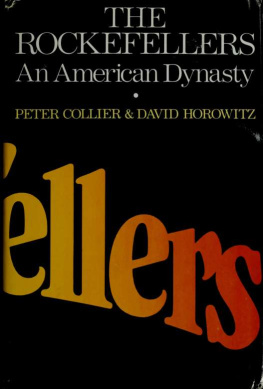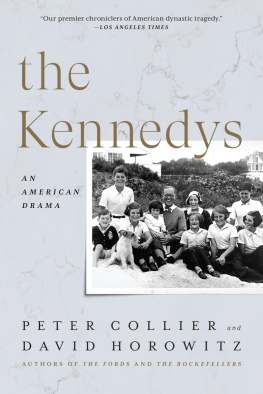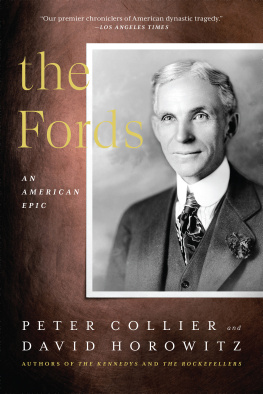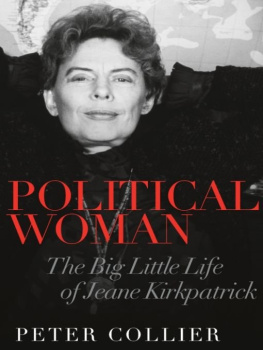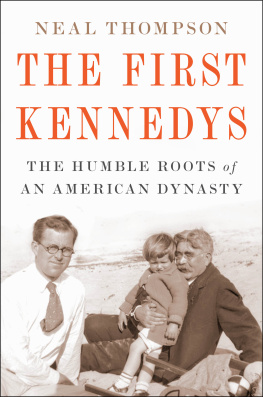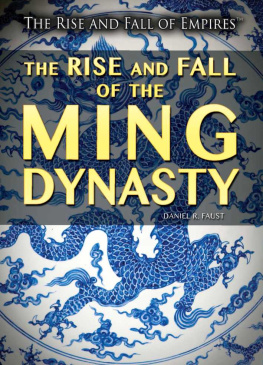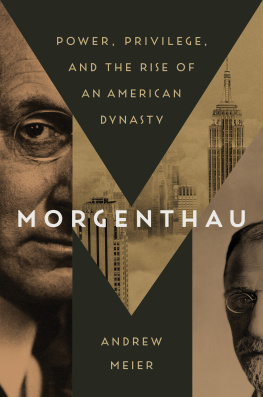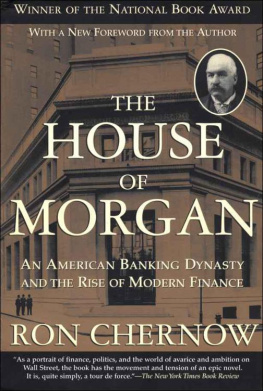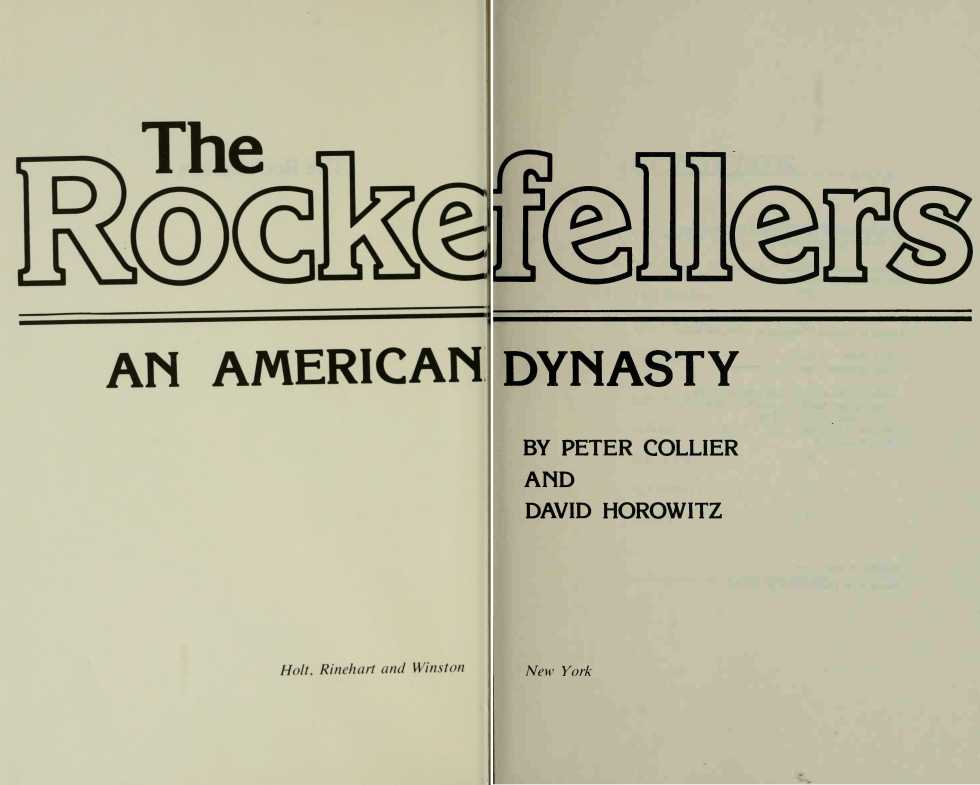All rights reserved, including the right to reproduce this book or portions thereof in any form.
Published simultaneously in Canada by Holt. Rinehart and Winston of Canada. Limited.
The Father
'Tho men have been supreme in creating the modern world: Rockefeller and Bismarck, One in economics, the other in politics, refuted the liberal dream of universal happiness through individual competition, substituting instead monopoly and the corporate state... "
Bertrand Russell
IN THE EARLY YEARS of the twentieth century, when the Protestant church was united in its crusade to save the heathen world, the Congregationalists worked hard to conscript their share of Christian soldiers for assignment to the dark lands where the climactic battles between good and evil were to be fought. It was an expensive war, and under normal circumstances a group of the church's ministers meeting in Boston in early 1905 might have reacted to the announcement of a $100,000 donation to its Board of Foreign Missions with a prayer of rejoicing and perhaps a spontaneous chorus of the Doxology. But when they found that this great gift was from the purse of John D. Rockefeller, angry murmuring filled the room. One of the ministers rushed to the podium to demand that the Congregationalist elders return the gift of "tainted money" at once.
"Is this clean money? Can any man, can any institution, knowing its origins, touch it without being defiled?" the Reverend Washington Gladdenthe most eminent Congregationalist in the landhad asked. On every side, wealth had been accumulated "by methods as heartless, as cynically iniquitous as any that were employed by the Roman plunderers or robber barons of the Dark Ages. In the cool brutality with which properties are wrecked, securities destroyed, and people by the hundreds robbed of their little, all to build up the fortunes of the multi-millionaires, we have an appalling revelation of the kind of monster that a human being may become."
The controversy eventually spread from the small rented hall in downtown Boston to the whole nation. Newspapers were flooded with opinions on the mixed blessings of accepting the offering. The term "tainted money" entered the vocabulary of the common man. ("Sure it's tainted," went a vaudeville routine of the day. "Taint yours, and taint mine.") Yet few of the many Americans who pleaded with the Congregationalists to reclaim the $100,000 in the service of the Lord went so far as to suggest that the soul of the donor might also be saved. For John D. Rockefeller was the most unrepentant sinner of the day. Senator Robert LaFollette called him "the greatest criminal of the age." He was pilloried in newspaper cartoons as a long-shanked hypocrite giving away coins with one hand while stealing bags of gold with the other, and the laconic Mr. Dooley had said that he was a "kind of a society for the prevention of cruelty to money. If he finds a man misusing his money, he takes it away from him and adopts it." If there had been any lingering doubts about this strange, secret man with impassive eyes and a cruel slash of a mouth, Ida Tarbell's recently published History of the Standard Oil Company was enough to convince anyone that the name Rockefeller was a synonym for unbridled ruthlessness and power.
Of all the men Theodore Roosevelt indicted as "malefactors of great wealth," John D. Rockefeller was indeed the wealthiest. At the time of the "tainted money" controversy, his fortune amounted to $200 million; it would coast effortlessly, of its own velocity, to the $1 billion mark within a few years. (The sum staggered the imagination; one astute Christian calculated that it was more than would have been in Adam's bank account if he had deposited $500 every day since his precipitous exit from the Garden.) Yet in other ways Rockefeller was far different from the other great robber barons who had terrorized the land for the previous twenty years. A pillar of the Baptist church since his youth. Rockefeller's tithes already approached $100 million in 1905, and he was even then devoting his attention to creating the widest-ranging system of philanthropy the world had yet known. A loyal husband and devoted father, his courtly manner had disarmed many a government lawyer and made him wonder if this man was indeed not more sinned against than sinning.
He was retired now, but even in his heyday at the helm of the great Standard trust he had lacked the vaulting ambition and sharkish appetites of the Fisks, Goulds, Vanderbilts, and others. They knew no bounds; he was a man of balance. He never engaged in their daring vandalism on the stock market, never bilked the public with their abandon, never took part in their audacious securities swindles. He knew what business was and what it was not; no one would ever say of Rockefelleras crafty James Stillman of the First National Bank had said of the mighty J. P. Morgan"He was a poet."
S THE FATHER
Withal it was Rockefellerconfessed plodder and conservativewhom the public identified as the symbol of a heartless economic system seated firmly in the saddle and riding mankind. Whatever his private personality, the John D. Rockefeller they knew had invented a new form of economic powerthe corporate trustfor a nation whose very lifeblood was business. And the menace he had come to exemplify was not that of the pirate operating outside the social norm, but of the unjust and uncontrollable power inherent in the norm itself. He was, in some sense, the system carried to its logical and unchecked extremethe competitor who utterly destroys the competition. It was no accident that the era Mark Twain had called the Gilded Age chose John D. Rockefeller to be its representative American.
As the trajectory of his business career climbed from triumph to triumph, people had scrutinized newspaper stories about his private life for some sign of unhappiness and failure, as though searching for a lost principle of equity in the world. When a New York journalist reported with satisfaction that Rockefeller's stomach was so disordered he was forced to subsist on milk and bread and would have gladly given part of his bulky fortune for the ability to digest a steak, there was exultation.

